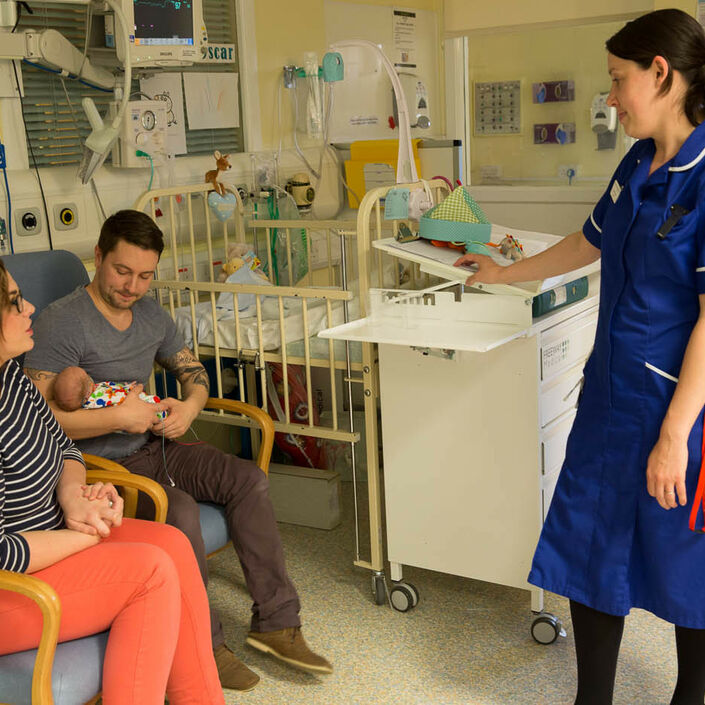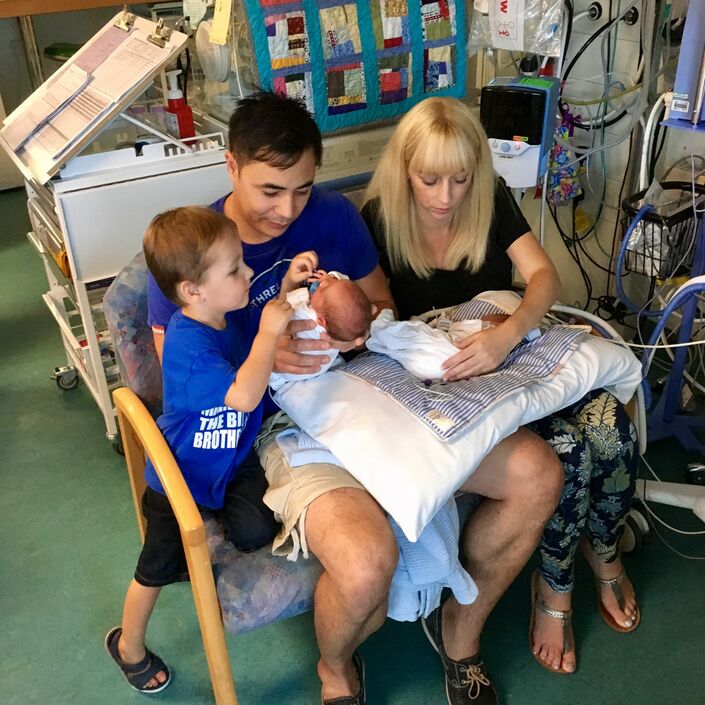Depression
Having a baby who is unwell can leave you feeling very low. Spending a lot of time in hospital and not knowing what will happen next can leave parents feeling very sad, overwhelmed and exhausted.
Depression can come in many forms, and can affect people in many different ways. You could, for example, feel very low for a period of time where you are struggling to cope with life on the unit, or when something in particular has happened. This is a very common way to react to having an unwell baby, especially if you are also recovering from the birth.
Depression, however, is where this feeling doesn’t pass with time, and begins to get in the way of other parts of your life. It could be that you feel like you can’t cope with parts of daily life, your mood has changed, or you’re behaving in a different way.
Find out more about depression, what the symptoms are, and how you can get support from NHS Choices, or from Mind.
What is postnatal depression?
You might have also heard about another type of depression called postnatal Depression, or PND. This is when depression starts after having a baby.
We know that parents who have a baby in neonatal care are more likely to suffer from post-natal depression. Find out more about Bliss’ research into parents’ mental health on the unit here.
It is usual for mums to feel down after just having a baby. This is because the birth and first few days of a new baby coming into your life is a big adjustment to parents’ lives. You often have less sleep and can feel overwhelmed by the change to your routine. This period of feeling low is often called the ‘baby blues’.
But postnatal depression lasts for longer than this and has a bigger impact on you.
Find out more about post-natal depression, what the symptoms are and what support is available to you from NHS Choices, or from Mind.
Can partners also suffer from depression?
Whilst only mums who have given birth can be officially diagnosed with postnatal depression, studies show that partners can develop depression after the birth of their baby too. Find out more about how depression can affect partners from Mind.
If you do think you are suffering from depression, it is important that you get help and support. Staff on the unit can help you talk about what options might help for you. You can also find out more about support for you on our page here.
What is post traumatic stress disorder (PTSD)?
When something happens to you which is hard to process and has a big impact on your life, it can feel very traumatic. You might find that you feel numb, find it hard to sleep, or find it hard to talk about what you’ve been through.
You might have some more intense feelings, like thinking you are living your experience again.
You may have vivid nightmares, or feel very anxious a lot of the time. It might be difficult to face the places or situations which you link with that trauma.
These symptoms can be very common for many parents on the neonatal unit, and are a normal reaction to a traumatic experience. Feeling these symptoms for a short amount of time is common, and won’t usually be given a name or diagnosis. If you do talk to a professional about how you are feeling, they might call short periods of these feelings acute stress disorder, or ASD.
PTSD however is a condition which can be diagnosed from four to six weeks after the trauma you’ve experienced, if particular symptoms are not going away.
Some of these reactions to trauma are very common and can pass in short periods of time. PTSD is only diagnosed in people where those feelings are lasting for longer and having a bigger impact on their lives.
Your GP or other health professional will talk through your symptoms with you. PTSD describes specific symptoms in certain circumstances, and there are many different reactions to trauma.
It may be that you experience some of the same symptoms, but are not diagnosed with this or any other condition. Whatever the outcome of talking with your health professional, they will help you to find the support that is right for you.
Find out more about PTSD, what the symptoms are, and what support is available for you from NHS Choices, or from Mind.
Who suffers from PTSD?
Parents who have a baby in neonatal care can suffer from symptoms of trauma or PTSD if they’ve had a difficult or traumatic birth. For example, giving birth unexpectedly much earlier than usual ,or needing emergency procedures during birth.
These symptoms can also come about as a result of something very distressing that happens after your baby is born, like if they need surgery, need to be resuscitated, are very unwell, or you are separated from them.
Being in hospital can also feel traumatic and very worrying for parents, especially if you are based in a unit far away from your home.
Experiencing trauma can come from many different situations – what causes this response will be different for different people. If you feel you are experiencing trauma, whatever you have been through, it’s important to get support.
It’s not just mums who have given birth who can suffer from symptoms of trauma or PTSD. Partners can also suffer with symptoms, especially if they’ve seen their partner go through a traumatic birth, or they’ve faced very difficult and upsetting situations on the unit.
When does PTSD happen?
Symptoms of trauma can happen quite soon after a traumatic experience – for example soon after your baby has been born. PTSD can be diagnosed from four to six weeks after the traumatic experience, if particular symptoms are not going away.
Sometimes, symptoms of PTSD can start later on, months or even years after what has happened to you. We sometimes hear that parents start to have symptoms when they leave the unit and go home, or after a big milestone like a first birthday.
If you are experiencing symptoms of trauma which are not going away or are getting worse, and you think you might be struggling with PTSD, it is important that you get help and support. Staff on the unit, or your GP, can help you talk about what options might help you. You can also find out more about support for you on our page here.
What is birth trauma?
Researchers are learning more about trauma, how it affects us and what causes it. It is well known that birth and things that can go wrong during birth can be a big cause of trauma in parents giving birth and partners watching this.
If you are experiencing symptoms of trauma after your baby has been born, your health professional might talk to you about a type of trauma called birth trauma. You can find more information and support from the Birth Trauma Association.
Other conditions
If you do see a health professional about your mental health, they might talk to you about some other conditions you could be suffering with. These could include conditions like Obsessive Compulsive Disorder (OCD), or separation anxiety. They might also talk with you about any conditions you’ve been diagnosed with before, like depression, anxiety or bipolar disorder.
Sometimes, what you’re feeling won’t be given a name or a diagnosis, but you can still feel as though you are struggling and need support. Talk to your health professional about what might help you, and take a look at our page on what might be useful for you.
You are not alone
What you feel and experience might change during your time in neonatal care. Some feelings might come and go, and others might stay for longer. You might find support from friends and family, or you might need different options to help you.
Whatever you may be feeling, we’re here for you
Read more about looking after yourself and where you can get support here.
Listen to our podcast, featuring other parents talking openly and honestly about their struggles with their mental health.
You can also contact us at hello@bliss.org.uk for information and emotional support.


